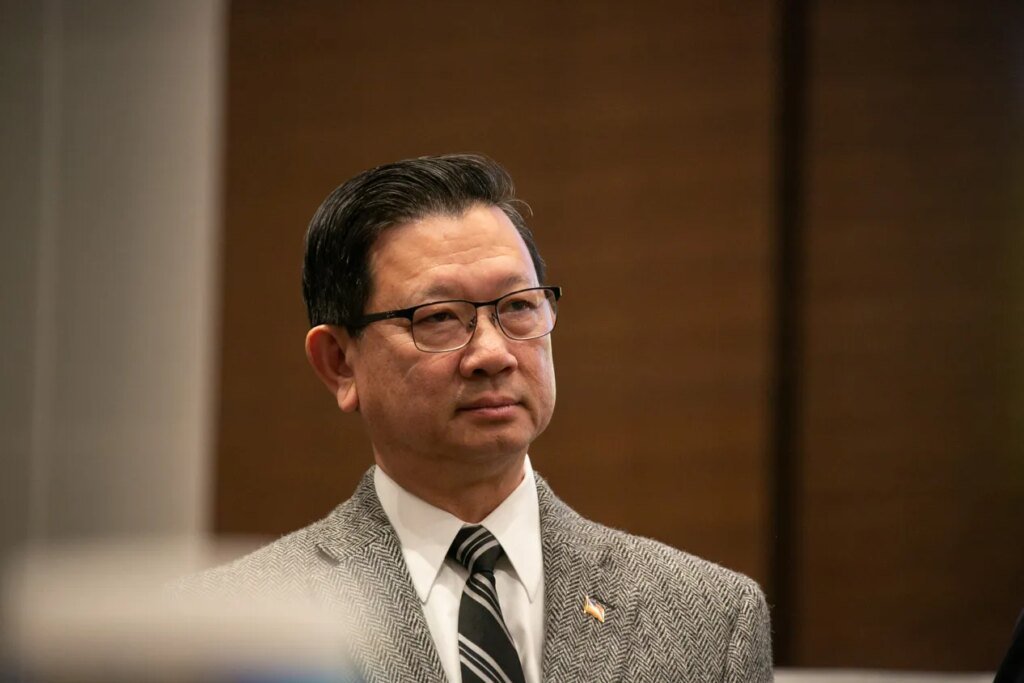Recent Developments in Orange County’s Public Health Agency: A Call for Transparency
Orange County has recently been embroiled in controversy following the guilty plea of former county supervisor Andrew Do, who is currently serving a five-year prison sentence for accepting bribes. Do’s resignation as chair of CalOptima’s board and the subsequent scrutiny into the agency’s operations have sparked significant calls for transparency regarding an investigation report that has remained under wraps. This report is particularly crucial, as it may shed light on the corrupt practices that have plagued the agency.
CalOptima, the public health plan for the county’s low-income residents, has been at the center of scrutiny amid allegations of misconduct, particularly surrounding Do’s influence over county contracts. While the agency’s leadership has argued that the investigative report created by an external law firm cannot be disclosed publicly, this lack of transparency has drawn criticism from various county supervisors, further deepening concerns about accountability within public health governance.
Bridging the Gap Between Accountability and Governance
The CalOptima board convened for the first time since the completion of the investigation, but the report’s contents remain elusive. It was not listed on the agenda for discussion, and board members were restricted to reviewing it only in the presence of CalOptima staff. Such restrictions have raised alarms among county leaders who demand accountability and open conversations around governance practices. Vicente Sarmiento, a current board member, stated his commitment to advocating for the report’s release, emphasizing the public’s right to understand the conclusions drawn from the investigation.
In a broader context, the absence of adequate communication regarding the findings fuels a narrative of mistrust among the community. The calls for openness resonate especially among supervisors not serving on the CalOptima board, who have voiced their support for immediate disclosure of the report to ensure that taxpayers are adequately informed about how their money is managed. Such a scenario underscores the need for transparency within public agencies aimed at serving vulnerable populations.
Political Ramifications and Public Sentiment
Political ramifications have arisen from this investigation, amplifying its significance within Orange County’s political landscape. Various county supervisors—including Katrina Foley, Don Wagner, and Janet Nguyen—have publicly supported calls for releasing the findings. Supervisor Janet Nguyen directly labeled Andrew Do as “Orange County’s most corrupt politician,” signaling a strong public sentiment against corruption in local politics. Such statements illustrate that there is widespread anticipation for accountability in the wake of misconduct.
The political dimensions of this situation extend beyond mere scandal; they reflect a deeper desire for ethical governance in a public health institution tasked with overseeing vital services for the county’s most disadvantaged residents. Calling for transparency is not an isolated demand but rather a collective concern for upholding integrity and accountability within public service.
Navigating the Challenges of Public Corruption
Addressing public corruption necessitates active engagement from all levels of government. The challenges posed by corruption can hinder the functionality and credibility of essential public health programs. The ongoing situation surrounding CalOptima is a reminder of the systemic issues that can arise when there is a lack of oversight and transparency in public agencies. The reluctance to share investigative findings could set a concerning precedent, suggesting that those in positions of power are not held accountable for their actions.
As the investigation’s findings remain pending disclosure, the need for a collaborative approach between county officials and community stakeholders becomes increasingly vital. Empowering local citizens with knowledge about public health governance can help foster an environment that is both transparent and accountable, ultimately contributing to the betterment of community health.
The Way Forward: Advocating for Transparency
As the events unfold, it is imperative for county leaders to prioritize transparency in their communications. The pressure from county supervisors, including calls from board members and non-board members alike, highlights a growing consensus on the importance of clear reporting and accountability. Emphasizing the need for public awareness will serve as a powerful tool for advocating for policy changes aimed at rectifying systemic issues within CalOptima and beyond.
Moreover, moving forward, there is an opportunity to establish more robust mechanisms for public oversight of health agencies. Leveraging technology and community engagement strategies could enhance transparency and restore public trust. As residents await the release of the investigative report, the overarching question remains: how effectively will local governance adapt to demands for accountability in the wake of such serious allegations?
Conclusion
The call for the release of the CalOptima investigative report symbolizes broader themes of trust, accountability, and ethical governance in public health. As the community watches closely, it becomes essential for county leaders to prioritize transparency, ensuring that public health agencies can operate effectively and serve vulnerable populations. The ongoing discourse and actions taken will undoubtedly impact how public institutions are perceived and function in Orange County, making it crucial for all stakeholders to engage constructively in the dialogue for accountability.
Boost your health naturally—click here to shop Nature Made vitamins at NatureMade/TheOCJuice and enjoy 25% off your first order! Shop Now!





